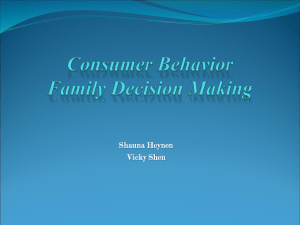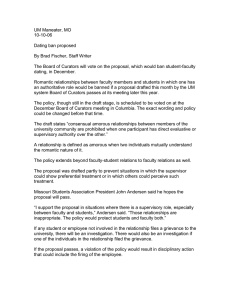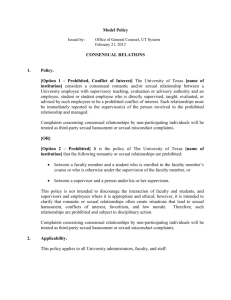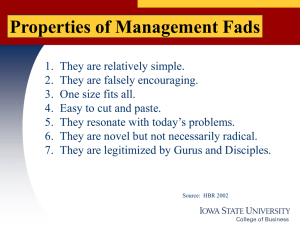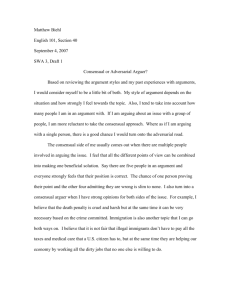Introduction and Purpose of Policy. Pacific University
advertisement
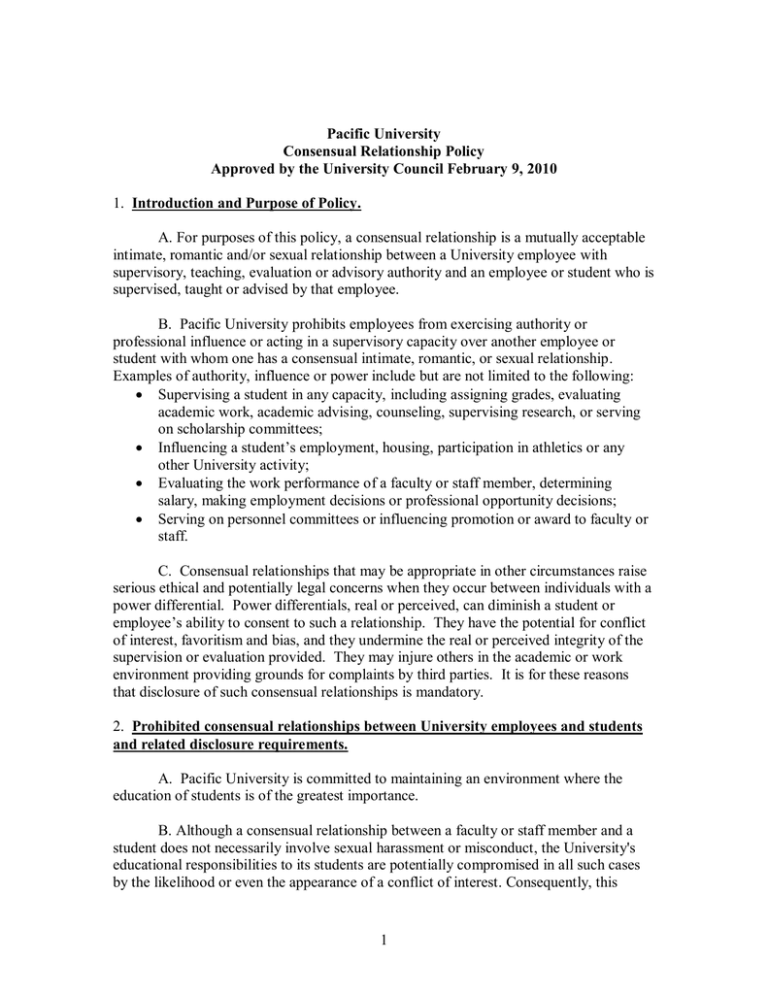
Pacific University Consensual Relationship Policy Approved by the University Council February 9, 2010 1. Introduction and Purpose of Policy. A. For purposes of this policy, a consensual relationship is a mutually acceptable intimate, romantic and/or sexual relationship between a University employee with supervisory, teaching, evaluation or advisory authority and an employee or student who is supervised, taught or advised by that employee. B. Pacific University prohibits employees from exercising authority or professional influence or acting in a supervisory capacity over another employee or student with whom one has a consensual intimate, romantic, or sexual relationship. Examples of authority, influence or power include but are not limited to the following: Supervising a student in any capacity, including assigning grades, evaluating academic work, academic advising, counseling, supervising research, or serving on scholarship committees; Influencing a student’s employment, housing, participation in athletics or any other University activity; Evaluating the work performance of a faculty or staff member, determining salary, making employment decisions or professional opportunity decisions; Serving on personnel committees or influencing promotion or award to faculty or staff. C. Consensual relationships that may be appropriate in other circumstances raise serious ethical and potentially legal concerns when they occur between individuals with a power differential. Power differentials, real or perceived, can diminish a student or employee’s ability to consent to such a relationship. They have the potential for conflict of interest, favoritism and bias, and they undermine the real or perceived integrity of the supervision or evaluation provided. They may injure others in the academic or work environment providing grounds for complaints by third parties. It is for these reasons that disclosure of such consensual relationships is mandatory. 2. Prohibited consensual relationships between University employees and students and related disclosure requirements. A. Pacific University is committed to maintaining an environment where the education of students is of the greatest importance. B. Although a consensual relationship between a faculty or staff member and a student does not necessarily involve sexual harassment or misconduct, the University's educational responsibilities to its students are potentially compromised in all such cases by the likelihood or even the appearance of a conflict of interest. Consequently, this 1 policy prohibits consensual relationships between a faculty or staff member and a student whenever the faculty or staff member is currently or potentially in a position of authority, influence or power with respect to the student. C. When a faculty or staff member is currently or potentially in a position of authority, influence or power with respect to a student, he or she has the obligation to disclose the consensual relationship with such student to his or her supervisor. The supervisor must immediately report the disclosed consensual relationship to one of the following University officials: the Vice President for Academic Affairs, the Vice President for Student Affairs, or the Vice President for Finance and Administration. D. It is the obligation of the supervisor, in consultation with appropriate academic or administrative personnel, to take the steps that she or he deems necessary to ensure that the educational experience of the student, and other students in the University, are not materially affected by the subject consensual relationship. 3. Prohibited consensual relationships between University employees and related disclosure requirements. A. This policy prohibits faculty or staff members from exercising supervisory responsibility with respect to another faculty or staff member with whom they are involved in a consensual relationship. A faculty or staff member who enters into a consensual relationship with a coworker over whom he or she has authority, professional influence or actual or perceived power is required to promptly disclose the relationship to his or her supervisor. The supervisor must immediately report the disclosed relationship to the Vice President for Finance and Administration or the Vice President for Academic Affairs. B. It is the obligation of the supervisor, in combination with appropriate administrative personnel, to take reasonable and necessary steps to ensure that the work environment among coworkers of employees having a consensual relationship is not materially affected by the subject consensual relationship. 4. Discretionary Action by the University. Since individual cases may vary, the University has discretion to consider relevant circumstances—the nature of the relationship, the specifics of the student’s academic program, the employee’s duties, the management and supervisory relationship between two employees having a consensual relationship and constraints on the University—in fashioning these steps. Typical steps may include the facilitation of alternative supervision processes, the recusal of the employee from matters involving a student, changes in an employee’s duties or employee reassignment. 5. Consequences for failing to disclose a consensual relationship. Employees who are engaged in an intimate, romantic and/or sexual relationship with a student or fellow employee and are unsure whether disclosure is required under this agreement are required to disclose the relationship. Employees who fail to disclose a consensual relationship as 2 required by this policy or who otherwise violate this policy are subject to disciplinary action up to and including termination of employment. 6. Protection offered to parties who disclose. A. Disclosures of consensual relationships are treated as highly sensitive information and special attention is given to the issue of privacy for all individuals. Information is divulged only on a need-to-know basis. B. It is a violation of this policy to retaliate against any individuals who seek advice or action concerning this policy or to retaliate in any manner against individuals who assist in investigations under this policy. Persons who engage in retaliation are subject to disciplinary action up to and including termination of employment. 7. Nonconsensual Relationships. If a consensual relationship becomes nonconsensual, unwelcome romantic or sexual conduct by either party to the relationship, if reported, may be regarded as sexual harassment under the University’s sexual harassment policy. 3

